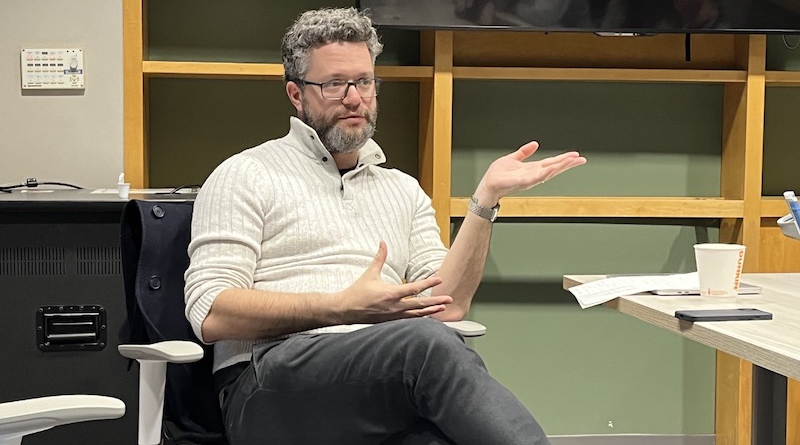Ilya Lozovsky on the Ukraine-Russia War and Investigative Journalism
By Vishal Manve, MALD 2023 Candidate, The Fletcher School
On February 28, 2023, Ilya Lozovsky, a writer and senior editor at the Organized Crime and Corruption Project (OCCRP), gave a talk at Tufts University about investigative journalism and the war in Ukraine. The talk touched on various subjects, including the war’s geopolitical implications and the challenges it presents to investigative journalism.
Lozovsky discussed how the conflict has highlighted issues of repression, disinformation, propaganda, personal and collective responsibility, reporting standards, and audience relationships. He also noted the unique perspective that OCCRP journalists, who are from both Russia and Ukraine, bring to this issue.
He described OCCRP’s investigative methodology, which focuses on real estate purchased in external countries through shell companies to stash funds away from authorities’ scrutiny. He shared details about a “memorable investigation” into Azerbaijani President Ilham Aliyev’s family investments, in which his family owned $700 million worth of properties in the UK.
Lozovsky also highlighted the role of corporate leaks in fueling investigations like these and others, like the Panama Papers. He outlined how corporate firms and lawyers act as enablers for laundering money in offshore sites.
On the role of journalism, Lozovsky expressed caution and outlined challenging conditions for the news media ecosystem. He said, “I think journalism should be seen as a public good, and quality journalism should be seen as a service that society needs for democracy to function. We don’t live in a world where journalism is a public good, and all the incentives in the media are terrible.”
Lozovsky further outlined the revenue and subscription models driving the quality of news coverage and how these impact news perspectives. He added, “Some of the best news outlets including The New York Times are lucky because they are on top of the [subscription] pyramid and everyone subscribes to them. The goal is to get subscriptions and have a high-minded public mission but they tend to emphasize a lot on bad news because people tend to click on that.”
Lozovsky explained that the OCCRP’s funding model is not based on web traffic or subscriptions, as the organization receives funding from different organizations for its public interest journalism. In response to a question on success metrics for OCCRP, Lozovsky said, “Even if The New York Times does a very cursory reference to one of our stories, we are fulfilling our mission for the public good. We have partnered with The Guardian and Forbidden Stories in France, and our work does appear in other outlets.”
On journalism and security threats, Lozovsky said, “We put a lot of money from our grants into our member centers in the form of safety and training to ensure the safety of their offices. I keep coming back to the point that journalism should be a public good because we can at least afford to cover some of these expenses, but our partners cannot.”
Lozovsky also discussed Ukraine’s aspirations to join the EU and the challenges that the country faces in meeting the EU’s requirements for membership, including the need for a rule of law and institutions that prevent corruption on a large scale. He also acknowledged the issue of backsliding on media freedom within the EU, citing Hungary as an example. Despite these challenges, Lozovsky noted that his organization has two local investigative reporter partners in Hungary, who are doing great work.
Finally, Lozovsky discussed environmental activism in Russia. He noted that protests were not very common in the past, but more recently there has been a rise in local protests around hyper-local issues. He also pointed out that corruption is often behind these protests.
“Behind protests against development or protests against how the landfill issue was handled, there will always be some corruption,” he concluded.

